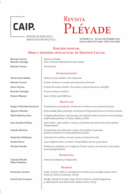Spectrality, lack and ontology. The theory of hegemony in front of his reverse excluded

Published 2015-12-27
Keywords
- discourse,
- hegemony,
- spectrality,
- justice,
- ethics
How to Cite

This work is licensed under a Creative Commons Attribution-NonCommercial 4.0 International License.
Abstract
The objective of this article is to read the work of E. Laclau, by putting an emphasis on its relationship with the thought of J. Derrida. The point of confluence between the two authors is well known, not only for their public friendship, but also for their mutual referral in their several writings. However, the Argentine theoretician graduallyd move away from the principles of the thinker of El-Biar. This research aims at demonstrating that the exclusion of the premises of deconstruction does not involve a mere decision or theoretical preference, but responds to the fact that deconstruction constitutes an excess for the hegemonic logic. In this way, the proper political writings of Derrida are not part of the laclausian corpus. The notions of justice, unconditionality and spectrality, cannot be articulated within Laclau’s theoretical framework that is more attentive to the construction of political identities, rather than to explore those elements that destabilize them.